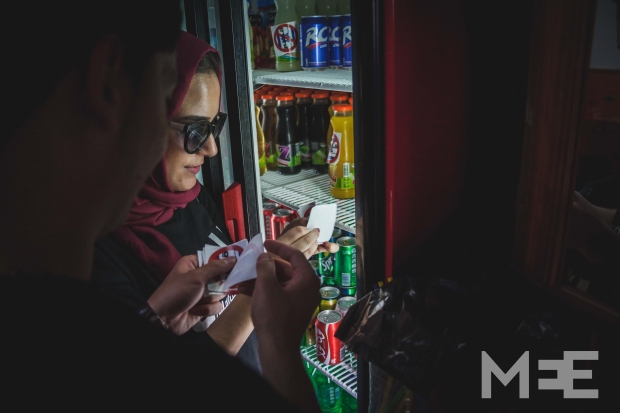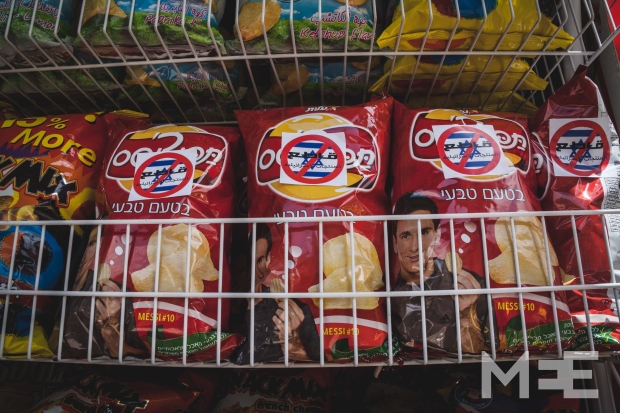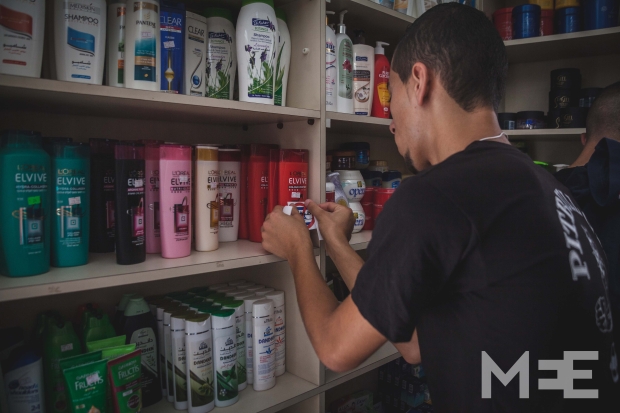Reeling from Gaza losses, Palestinians in the West Bank organise boycott

For the last month, a strange phenomenon has been emerging in the West Bank. Quietly and unexpectedly, stickers are appearing on particular brands of yogurt, coffee or shampoo in shops and markets. Blue-and-white, and smaller than a postage stamp, they’re printed with a mysterious figure: “16 percent.”
What does the opaque figure mean? It's explained in the labels’ smallprint: “16 percent goes to the Israeli army.” And now the warning stickers, and others like them, can be seen on thousands of made-in-Israel products, in stores all over the West Bank.
They’re markers of a dramatic shift. For the last month, Palestinians here have looked on in powerless shock as Israeli jets killed nearly 2,000 of their compatriots in Gaza. As they watched as neighbourhoods in the strip were totally flattened and they hear from friends or family with life-changing injuries, they are both horrified and frustrated. Disgusted at the bloodshed created by the Israeli military, the West Bank is desperate to do something – and now, it’s boycotting Israel en masse to take a stand.
“I’ve been working on boycotting since I was a kid, but this is the first time in my life that I’ve seen everyone doing it.” 18-year old Sara al-Asfar said. A volunteer at the Palestinian National Initiative, she's spent her summer creating campaign materials from its community centre, a small space decorated with children’s drawings, in Ramallah. “Before the war on Gaza, we found a lot of people objected to the boycott. But this war, it’s the hardest and the longest. Everyone has their friends and their family in Gaza. People want to do something about it.”
Sara is part of one of several pro-boycott organisations that have sprung up or gained momentum since the Gaza operation began. Posters, stickers and demonstrations are now unavoidable in West Bank cities. In one of the most ubiquitous, photographs of popular Israeli juice, coffee or ice cream are shown to equal a bullet: the clear message is that buying Israeli products means funding a government that is killing Palestinians.
The campaign has put momentum behind a dramatic - and organic - public shift toward supporting the boycott of Israel in the occupied Palestinian territories. The change is partly down to the bloody omnipresence of Gaza’s social media coverage, partly to the dead-end of peace negotiations that have compelled Palestinians to consider new tactics. And the impact it has had on the market is just as swift and sharp.
The West Bank’s slickest and largest supermarket, Bravo, has committed to take Israeli products off its shelves. Its largest coffee and sweets chain, a heady wonderland of cocoa and coloured foil wrappings, no longer stocks them at all. Many smaller stores won’t replace their existing Israeli goods. At Zabaneh, an upmarket food store in Ramallah, proprietor Aziz Helweh indicated three rows which once held Israeli foods but are now dominated by Arab brands. “Some activists came here with their stickers, but they didn’t find anything to put them on,” he said.
Bravo’s flagship store is in the Plaza mall, a shiny development on the edge of Ramallah that houses mainly Palestinian fast food chains and stores. According to Marketing Manager Yousef Sider, many of the supermarket’s staff have wanted to implement a boycott for years, but until last month, the move was commercially and psychologically impossible. Before the Gaza bloodshed, he explains, many customers would have been driven away by the boycott – they enjoyed Israeli products, and simply would have taken their business elsewhere to get them.
“This decision wasn’t possible to take before the war. It was in our minds, but if we had done it, customers would have gone to our competitors,” he explained. “But now they are more aware. The Israeli government kills our people, destroys our homes, and occupies our land and bodies. That is why we need to stop buying from Israel. People know that if you buy Israeli products, you are supporting the occupation. It’s tax money, but it’s still money.”
So far, Bravo stores have replaced major Israeli brands, such as Strauss Group, from its shelves, and over the next three months, they’ll source replacements and withdraw the rest. Sider believes that it is a spontaneous shift, rather than the pro-boycott campaigns that have prompted the move.
Jeryes Sharbain, who runs a book store in Ramallah, agrees. He started to remove Israeli products from his shopping basket two years ago. He simply couldn’t accept, he said, the profits funding the Israeli government and the “bullets and bombs they would use against us.” But now boycotting is not just about avoidance. It’s one of the sole means of resistance for many. Decades of oppressive occupation, a peace process that’s gone cold and the escalating death toll in Gaza have left the population of the West Bank angry and frustrated – and all the more so, when they lack the tools to do much about it.
“After the war, people are starting to realise that it’s the only option to face the occupation,” Jeryes explained. “We Palestinians tried everything, and nothing seems to work. But when you hit a country’s economy, even if it’s just ten percent – well that’s something Israel doesn’t want.” At Mubadara, Sara al-Asfar echoes the sentiment. “What’s the point in throwing rocks against a gun?” she says. “Different people have their own way to resist, but everyone can boycott.”
And while much of the drive to boycott is about frustration - a need to do something, whatever that might be – it’s also a core and reasoned strategy for organisers. That’s because it confronts the mechanisms that keep so many Israeli products on the shelves - mechanisms many experts say have benefited Israeli trade while keeping the Palestinian economy weak.
“The stated objectives for the agreement and the economic policies is to help achieve peace, set economic relations for the PA and Israel, and to allow the Palestinians to have their own economic decision making,” Ismat Quzmar, a researcher at the Palestinian Economic Policy Research Institute in Ramallah said. Quzmar referred to the Paris Protocol, a 1994 annex to the Oslo Accords that set economic relations between Israel and the occupied Palestinian territories. Among other things, the deal set out Israel and the occupied Palestinian territories as an integrated economic zone, and tied Palestinian value-added tax and gas prices to Israel’s.
“The real meaning of economic integration was exploitation,” Quzmar argued. “All the gains of integration are reaped by Israelis. For Palestinians, it meant more dependence, and economic subjugation.”
The hypothesis is certainly borne out by numbers. Israel accounts for 72 percent of Palestinian imports and 90 percent of its exports, but the Palestinian Authority runs an immense trade deficit, importing more than five times what it exports according the the Palestinian Bureau of Statistics. Producing commercially viable goods is difficult for Palestinians when borders, taxation and 61 percent of the West Bank’s land – where much its agricultural potential, key resources and room for development lies – is controlled by Israel. For Palestinians, the consequences of this – a labour force participation rate of just 44.5 percent in a heavily aid dependent economy – are grim.
Critics argue that boycotting Israel is destructive to dialogue in the region – and that by attacking their main partner for trade, Palestinians are destroying their own opportunities to thrive.
Hilik Bar, Labor MK deputy speaker and chair of the Knesset caucus to resolve the Arab-Israeli conflict strongly discouraged West Bank boycotts, warning, “I personally believe that BDS and the boycott are not helpful the the peace process, or to the Palestinians working in the factories, and not to the Left in Israel.
"Often the right is telling us that these aren't our partners; we need to show that we can work with each other. The good tools we are having are to sit and talk with each other. I think that the failure of the talks now shouldn't tell us this is doomed to fail.
"From the Palestinian side there is a big movement of anti-normalisation that doesn't believe there should be economic cooperation until the occupation is over. This is a mistake. There are a bunch of very beautiful projects in energy, commerce for example, that we are working with Palestinians on, that benefit Palestinians, and anti-normalisation threatens these.
"If Palestinians decide they want to renew the efforts for the economy only after an agreement, this should be something that pushes us to an agreement. But at the moment there is a lot we can do to improve the economy, to work together and make life better for Palestinians,” Bar added.
Quzmar doesn’t agree. He believes the occupied Palestinian territories are now being used as a captive market for Israeli products: boycotting is about resisting this control and exploitation, and building a Palestinian economy that’s strong in its own right.
“A boycott is about getting rid of the distortions caused by 40 years of occupation,” he explained. “First, it will decrease the deficit in our trade balance with Israel. That will decrease the trade deficit in general, and this is very important for any economy. When we buy Israeli goods it’s like a channel. We have this huge influx of aid into Palestinian incomes, going from Palestinians, who already have less, to the more powerful Israeli economy,” he explained. “So basically, if we manage to close this drain, it will mean the money can circulate again in the Palestinian economy.”
At the Plaza mall, this re-investment is already happening: when managers found they didn’t have a replacement for fresh fruit yogurts, a Palestinian producer stepped in to develop its own, and sales of Hebron dairy producers have leaped dramatically. At Zabaneh Store, Aziz is keen to point out where brands need to innovate: compared to the luxurious, probiotic Israeli ranges, he says, many of the Palestinian dairy products all look the same.
“Many people still think Palestinian products are of less value, that Israeli products are better. But when you view the Israeli-Palestinian relationship in a coloniser-colonised context, you see this is about colonisation of the mind,” Quzmar said. “It’s about superiority and inferiority. Palestinian businesses and producers have to be smart, to use this chance to build bridges and convince the Palestinian consumer that their products can compete over Israeli products.”
The opportunity, he believes, marks a crucial shift. “This has emerged as a natural response to what people have been seeing, this obvious killing of civilians, destruction of homes, all this coming out from Gaza,” he said. “Israel sends a message to Palestinians: we want to continue killing you, we want to continue occupying you, we want to continue exploiting your natural resources. Why should they give up these economic gains, all this land if no-one is pressuring them? This campaign is an effective way of pressuring Israel. They are already talking about it as a strategic threat. We are on the verge of a turning point."
Even in the context of this new enthusiasm, the obstacles and difficulties of boycott won’t go away. There’s also a possibility that Israeli authorities could respond with restrictions on electricity or work permits. But those backing the boycott say they are prepared to take any consequences.
“We feel terrible in every part of our life. The Israeli occupation controls us, and what we want is our freedom,” Yousef Sider said. “We are prepared to suffer: if it means our freedom, we will do anything. An economic boycott is peanuts for us. We lived through two Intifadas. An economic boycott? We enjoy it!”
Stay informed with MEE's newsletters
Sign up to get the latest alerts, insights and analysis, starting with Turkey Unpacked
Middle East Eye delivers independent and unrivalled coverage and analysis of the Middle East, North Africa and beyond. To learn more about republishing this content and the associated fees, please fill out this form. More about MEE can be found here.







